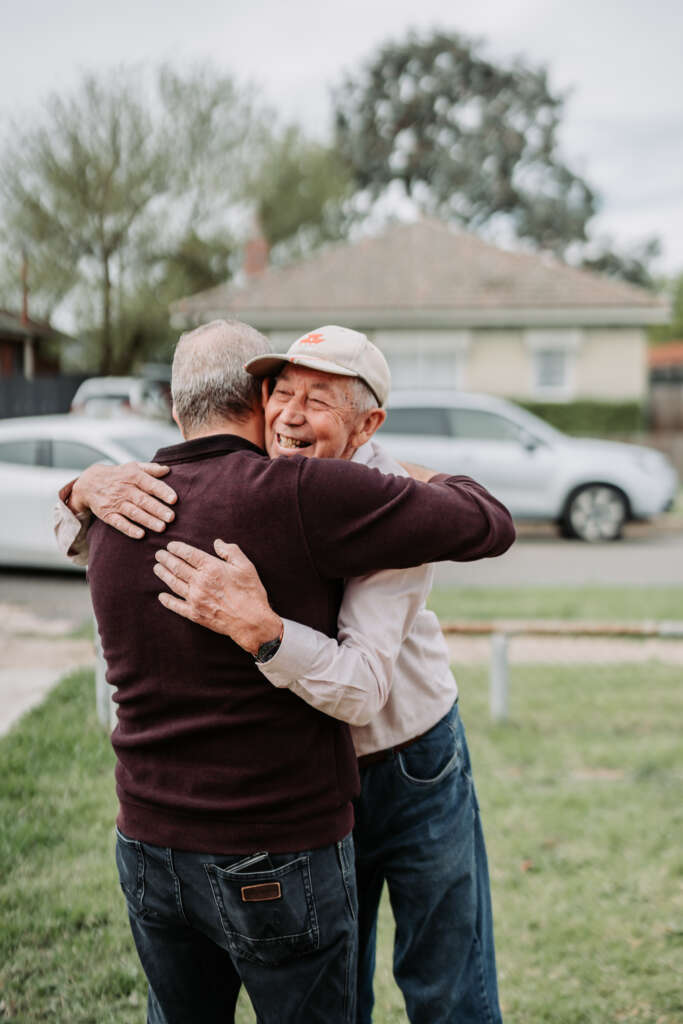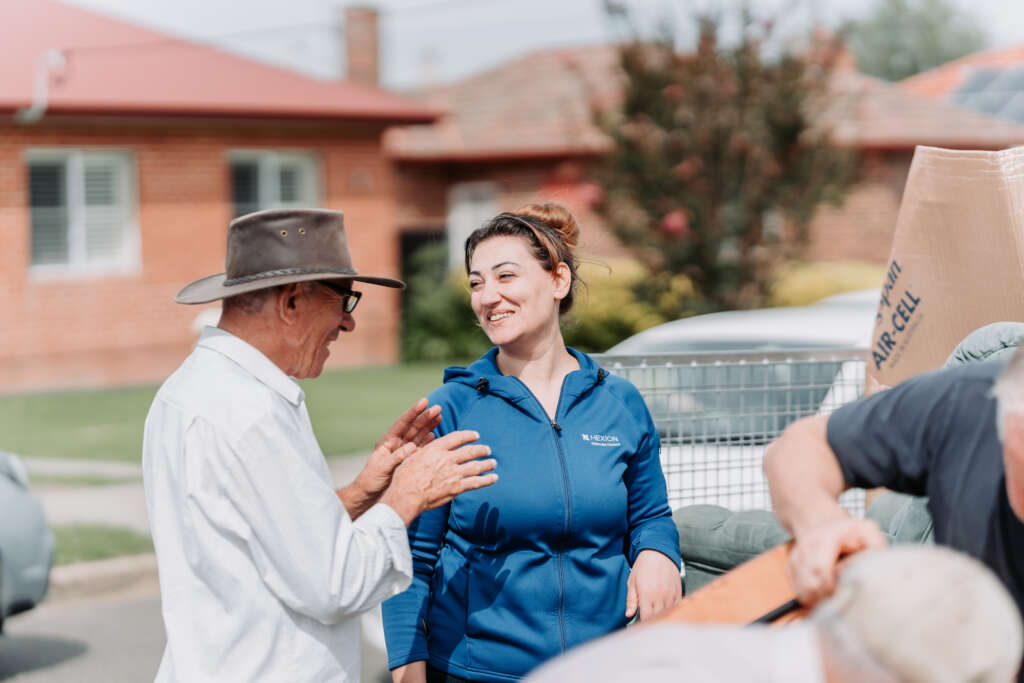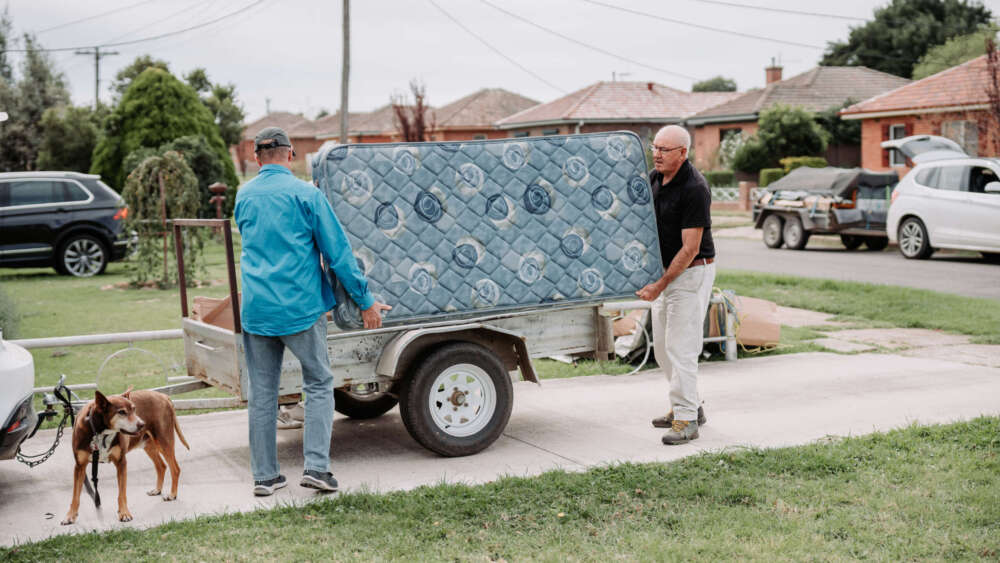'I was a stranger and you welcomed me ...'
New project helps churches embrace refugees
When Carrie Unser and her church group finally met their new refugee family at the Gold Coast airport, there were tears and hugs. It was “honestly like we were welcoming long-lost family members,” she says.
Carrie’s team had been excitedly waiting to help resettle a family from Congo, who had spent 12 years in a Malawi refugee camp, as part of a new program called CRISP (Community Refugee Integration and Settlement Pilot), which the federal government launched in May 2022.
Under this program, a group sponsors a refugee unknown to them. It raises funds to help them settle into the country, providing personalised, wraparound support to meet their needs and aspirations for the first 12 months after their arrival. The program runs for four years, with the aim of supporting 150 people. So far, about 40 households have been helped to settle.

A member of a community supporter group meets a Syrian refugee in Goulburn, NSW.
More than half of the community support groups in the pilot program come from faith communities. The Australian branch of NAYBA – a global network that helps churches transform their local neighbourhood – has launched The Welcome Home Project, providing a pathway for churches to get involved in the work of Community Refugee Sponsorship Australia (CRSA).
Launching The Welcome Home Project during a webinar last week, Tim Costello, patron of the NAYBA board and ambassador of CRSA, explained why he believed it was important for Christians to get involved in The Welcome Home Project. He said what he loved about the project was its expression of the biblical message of welcoming the stranger.
“When it comes to refugees, it’s quite surprising how blind so much of the church has been to their own sacred Scriptures,” he said.
While the love of one’s neighbour is mentioned a few times in the Old Testament, he said, “Far more times it’s mentioned that God’s face is seen in the stranger, the refugee. Welcome the stranger. Make them feel at home out of your abundance. Welcome them in your midst.
“For me, that idea that God’s face is seen in the stranger goes beyond just a little bit of justice. This goes to the heart of our deepest longing to know God, see God and worship God, the true God … Eternal life, the age to come, is already, in part, arriving here and now – seen in acts of justice, seen in acts of mercy, seen in acts of humility, by putting others first.”
“They’d never had a house before. All nine of them had been living in a shed, one tiny room, all sleeping side by side.” – Carrie Unser
Since welcoming their family of nine three months ago, Carrie’s team have journeyed with them, helping them to register for Centrelink and Medicare, find a school and a GP, as well as providing a house.
“As we were leaving the airport, I was walking with the mother and the sun came out and she looked up and was like, ‘Is this Australia? Have we arrived in Australia?’ And I said, ‘Yes, you are home.’ And she immediately dropped her bags, knelt down on the concrete and just put her hands up like, ‘Hallelujah, we’re home.’ She couldn’t believe it,” Carrie recalls.
“Another highlight was just taking them to their house, which we had set all up with little presents on each of their beds, and we fully stocked the fridge. They’d never had a house before. All nine of them had been living in a shed, one tiny room, all sleeping side by side. And for them to see everyone had their own bed, you should have seen their faces. The older girls weren’t quite sure what the fridge was. When they opened it up, we said, ‘This is where the food goes.’ You should have seen their eyes light up. There were some foods that they had enjoyed in the Congo and Malawi, and they couldn’t believe that we had some of that in the fridge also waiting for them.”
 As the group did a tour of the house, the father insisted on praying a prayer of gratitude and blessings over the house and over the team and his family.
As the group did a tour of the house, the father insisted on praying a prayer of gratitude and blessings over the house and over the team and his family.
“Everyone was in tears at that moment. We were all just sobbing and overawed at the situation. It’s been moving as they’ve settled into their house and their neighbourhood; seeing the mum get really confident. She now takes herself off to playgroup with the youngest, who is three. And just seeing her being embraced by her local community, they welcome her in there – they know her name, and they know the name of her little boy.
Carrie continues, “Another heart-warming thing for me was watching the primary-age kids go off to school. I was bawling but trying to hold it together because I honestly felt like I was watching my kids go off to school. But the school could not have been more welcoming and thoughtful.”
“Volunteer groups tell us repeatedly … that they feel they get more out of it than the refugee newcomers do.” – Lisa Button
Lisa Button, CEO of CRSA, explained that community sponsorship had grown out of a model developed by the faith community of Canada.
While government-funded refugee settlement agencies continued to support people on arrival, community sponsorship is providing a parallel pathway that involves everyday Australians in the system.
“It’s at the heart of our organisation that we want to see community sponsorship not only give everyday Australians an avenue to participate in welcoming the stranger, welcoming refugees, but also to expand the number of refugees who can come to Australia by bringing in the resources of private citizens, the community organisations they belong to, businesses and so forth,” she said.
“And when I say the resources, it’s about financial resources to some extent, but more importantly than that, it’s about the time and energy that everyday people can put into welcoming and supporting newcomers to this country.”
She said the experiences of the 40 households welcomed under the program so far had been overwhelmingly positive.
“We are looking forward to some findings being released very soon from an independent evaluation being run by the University of Queensland that will tell the same story about the refugee newcomers. We are hearing they are typically getting access to up to ten hours of support from their community supporter group each week, which is a game changer to get that level of personalised, wraparound support,” she said.
The way support is provided is very flexible, she said. “It’s really about the group getting to know the family, working out their needs, and then organising themselves around those.
“The volunteer groups tell us repeatedly how much they get out of the program. They tell us that they feel they get more out of it than the refugee newcomers do, that often it’s the most satisfying thing they’ve ever done, outside of raising their own families.”
“The biggest value in our support is just being with them and walking alongside them in this journey.” – Carrie Unser
For her part, Carrie said the most valuable part was being able to befriend the refugee family and spend time with them.
“Obviously, with a family of nine, there’s a lot of things that need to get done, and we would often get caught up in thinking, ‘We’ve missed this or we need to do this.’ But in reality, the big picture is this family is now home. There’s no time constraint. The biggest value in our support is just being with them and walking alongside them in this journey. We would often go to the home and meet them. I would have an agenda of things that I needed to tick off, whether that was showing them how to use the washing machine again or checking something they’d asked about.
“But often the biggest thing they wanted was people just to sit and talk with them and hear their story and talk about their life back home because they’d just left the only home they’d known for 12 years and come here. So yes, we’re supporting them to integrate and settle, but we’re also supporting them along that emotional journey of learning about a new place and what that means.”
If you would like to find out more or get involved in The Welcome Home Project, click here.
Enjoyed this story? Your support will help Eternity continue to provide free resources to millions of readers each year.
While mainstream and social media bombard us with bad news and messages that our faith is dying, irrelevant and intolerant, Eternity is committed to helping readers see the bigger picture: the good news of what God is doing in Australia and across the world. Every day, we find and tell stories to encourage, inspire, and equip you in your walk with the Lord.
Join us in our mission. Your donation will go directly to Eternity’s work and distribution.
Support Eternity from as little as $1. It only takes a minute. Thank you for supporting Christian content.
Email This Story
Why not send this to a friend?



